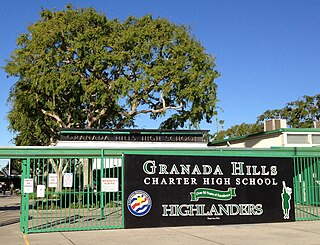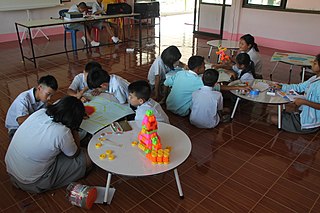Education reform is the name given to the goal of changing public education. The meaning and education methods have changed through debates over what content or experiences result in an educated individual or an educated society. Historically, the motivations for reform have not reflected the current needs of society. A consistent theme of reform includes the idea that large systematic changes to educational standards will produce social returns in citizens' health, wealth, and well-being.
School choice is a term for education options that allow students and families to select alternatives to public schools. It is the subject of fierce debate in various state legislatures across the United States.

Charter schools in the United States are primary or secondary education institutions which receive government funding but operate with a degree of autonomy or independence from local public school districts. Charter schools have a contract with local public school districts or other governmental authorizing bodies that allow them to operate. These contracts, or charters, are how charter schools bear their name. Charter schools are open to all students, depending on capacity, and do not charge tuition. 7.4 percent of all public school students attended a charter school in the 2021–2022 school year.

Project-based learning is a teaching method that involves a dynamic classroom approach in which it is believed that students acquire a deeper knowledge through active exploration of real-world challenges and problems. Students learn about a subject by working for an extended period of time to investigate and respond to a complex question, challenge, or problem. It is a style of active learning and inquiry-based learning. Project-based learning contrasts with paper-based, rote memorization, or teacher-led instruction that presents established facts or portrays a smooth path to knowledge by instead posing questions, problems, or scenarios.
Noble Schools is an open enrollment, public charter network of high schools and middle schools serving students throughout Chicago. Noble was co-founded in 1999 by Michael Milkie and Tonya Hernandez through a partnership between Ron Manderschied, President of Northwestern University Settlement House. Noble's first expansions, Rauner College Prep and Pritzker College Prep, opened in 2006. There are currently 18 schools in the charter school network: 1 middle school and 17 high schools. Noble schools are public and open to all students in Chicago and there is no testing required for admission.

The Princeton Charter School (PCS) is a K-8 Charter school in Princeton, New Jersey. Admission to the school is by lottery, available to all residents of the town, and free of charge. The school was founded in 1997, following the passage, by the New Jersey Legislature, of the Charter School Program Act of 1995. From the original class of 72, the school has grown to around 400 students. Students from the school go on to Princeton High School or one of several private schools in and around Princeton. The Charter School is a top academic performer statewide, especially in standardized testing, with 91% of students proficient in math and 92% of students proficient in reading. In 2019, the school was ranked as having the best teachers in the state by Niche.com. The main focus of Princeton Charter School's academics is on "core academic skills", with an emphasis on English and mathematics, which meet daily for one hour, while classes such as history and science meet daily for 45 minutes. A silent reading period is built into the schedule for students to receive individual help, as well as three recess period for all grades.
The District of Columbia Public Schools (DCPS) is the local public school system for Washington, D.C. It is distinct from the District of Columbia Public Charter Schools (DCPCS), which governs public charter schools in the city.

Arcadia Charter School is a project-based 6–12th grade charter school located in Northfield, Minnesota, United States. The school has previously been known as South-Eastern Minnesota School of Arts and Technology prior to 2003, and Northfield School of Arts and Technology from 2003 to 2012.

Grover Cleveland Charter High School is a public school serving grades 9–12. Cleveland Humanities Magnet is part of Cleveland Charter High School. The school is located along the community of Reseda Ranch within the neighborhood of Reseda, in the San Fernando Valley portion of the city of Los Angeles, California. Cleveland offers certain pathways and academic programs to personalize learning to the students, allowing for self-exploration. Cleveland offers a Media Arts, Visual Arts, STEM, Performing Arts, Liberal Studies, and World Language pathway. Cleveland's academic programs include the Academy of Art and Technology (AOAT) and the School for Advanced Studies (SAS). It has two magnet programs including the Humanities Magnet and the Global Media Studies Magnet.
The Lab School of Washington is a small independent school in Washington, D.C. for students with language based learning differences like dyslexia. The Lab School was established in 1967 by Sally Smith. Kim Wargo has directed the school since July 2020. The Lab School of Washington has an arts centered curriculum on two campuses: one on Reservoir Road, NW for middle through high school, the other on Foxhall Road NW for elementary students.

The Houston Academy for International Studies (HAIS) is a Houston Independent School District charter school in Midtown Houston, Texas, United States. It is located on the Houston Community College System's Central College campus. It opened in August 2006.

IDEA Public Schools, Inc is a not‐for‐profit charter school operator based in Weslaco, Texas. It was formed in June 2000. In 2015 it served about 19,000 students in 36 schools, about 85% of whom were economically disadvantaged.

The D.C. Everest School District is a public school district serving the city of Schofield, the villages of Weston, Hatley, Rothschild, and Kronenwetter, and the towns of Ringle and Easton in central Wisconsin.
Everest Public High School is a college preparatory, tuition-free, and public charter high school in Redwood City, California, United States. The school, which was modeled after Summit Preparatory Charter High School in Redwood City, opened in August 2009 following State approval of the Everest charter.
Expeditionary Learning Schools(ELS) are models of comprehensive school reform based on the educational ideas of German educator Kurt Hahn, the founder of Outward Bound. There are more than 150 Expeditionary Learning Schools in 30 US states and the District of Columbia. They feature project-based learning expeditions, where students engage in interdisciplinary, study of compelling topics, in groups and in their community, with assessment coming through cumulative products, public presentations, and portfolios. According to the ELS website students undertake tasks requiring perseverance, fitness, craftsmanship, imagination, self-discipline, and significant achievement.
BASIS Curriculum Schools, Inc. is a global network of both public and private schools that use the BASIS Curriculum. BASIS Curriculum Schools are made up of BASIS Charter Schools, BASIS Independent Schools, and BASIS International Schools.

Washington Latin Public Charter is a school in Northwest, Washington, D.C., United States. It features a middle and upper school, serving grades 5–12.
High Tech High is a San Diego, California–based school-development organization that includes a network of charter schools, a teacher certification program, and a graduate school of education. Students are admitted to the public elementary, middle, and high schools through a zip-code based lottery system in an effort to admit a demographically diverse representative sample of San Diego County.
The Marshall-Brennan Constitutional Literacy Project is civic education program in which law students work with local high schools to enhance understanding of constitutional law and oral advocacy. The project was founded in 1999 at American University's Washington College of Law in Washington, D.C., by Professor Jamie Raskin. There are now nearly 20 chapters in the United States, and there are 2 international chapters. The program began as a way of addressing civic disengagement and a lack of political participation. Through analyzing Supreme Court decisions and participating in moot court arguments, participating high school students learn about their rights as citizens, the strategic benefits of voting, how lawmaking occurs, and other fundamental constitutional processes. They also have the opportunity to compete in a national moot court competition.

A charter school is a school that receives government funding but operates independently of the established state school system in which it is located. It is independent in the sense that it operates according to the basic principle of autonomy for accountability, that it is freed from the rules but accountable for results.









